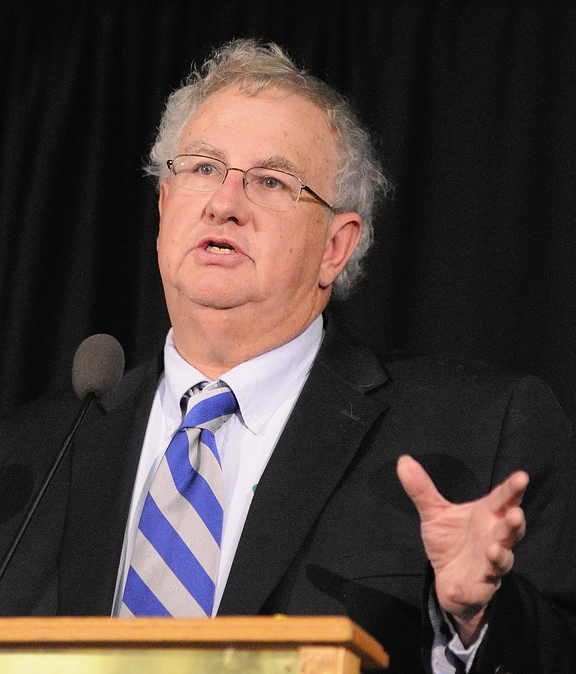AUGUSTA — Former state economist Charles Colgan opened his presentation about the U.S. and state economy for tax professionals with a black-and-white image of a woman tied to railroad tracks with a train steaming toward her.
The woman represented the economy, he said; and the train, Congress.
“The gap between where we are now and pre-recession levels of employment is almost entirely explained by federal fiscal policy,” Colgan said Wednesday afternoon at the Augusta Civic Center. “Not quite all of it, but about 90 percent if it. That’s a really heavy-duty set of problems we have to deal with here.”
Colgan, a professor at the Muskie School of Public Service at the University of Southern Maine, gave an overview of his predictions for the U.S. and state economies and described current issues in tax policy for the keynote of the annual Maine Tax Forum – a convention covering issues for tax professionals.
Besides outlining the ways federal fiscal policy and uncertainty have stunted the economy’s recovery, Colgan, who is known for his annual state economic forecasts each January, described problems related to Maine’s aging workforce and outlined ways tax issues should be addressed to keep the economy moving forward.
Colgan said fiscal uncertainty at the federal level has restricted the country’s economic output and made economic recovery more difficult.
Since the end of 2009, uncertainty about fiscal policy has reduced the growth of the U.S. economy by 0.3 percent per year, according to a study by Macroeconomic Advisors, leading to about 900,000 people not being hired, Colgan said.
That, coupled with reductions in discretionary spending as a result of fiscal action, such as the sequester cuts, has led to about 2.1 million jobs not being created since the end of 2009, close to the amount not yet regained from the Great Recession, Colgan said
He said the latest economic crisis – the battle about the debt ceiling in October, which led to a 16-day federal government shutdown – further damaged the economy’s growth with another possible showdown right around the corner.
Congress passed a continuing resolution Oct. 16 to fund the government until Jan. 15 of next year and suspended the debt ceiling until Feb. 7. Colgan told the audience to mark their calendars.
He said he expects, or at least hopes, the debate won’t lead down the same path as it did in October, but “the damage has already been done. The damage to the American economy from this lack of clarity about fiscal policy . . . has already been done.”
When asked what he would do if he controlled Congress, Colgan said he would get rid of the debt ceiling, which gives permission to the executive branch to spend money Congress already has approved.
At the state level, Colgan said Maine’s aging workforce and declining population will force the state to rely increasingly on attracting out-of-staters to live or at least work in Maine.
Paul Koenig can be contacted at 621-5663 or at:
pkoenig@centralmaine.com
Send questions/comments to the editors.


